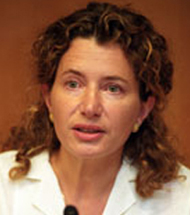10% of children do not speak or write properly at the age of 11
Dr. Schlumberger of the Raymond Poincaré Hospital, Paris, gave a lecture at the Center for Applied Medical Research, University of Navarra

"Language development disorders are very frequent in childhood, to the extent that 10% of eleven-year-olds do not speak or write correctly. This is a problem for public health, and a serious difficulty for our society. The data from France are similar to those found in Spain, and those in the majority of western countries", stated Dr. Emilie Schlumberger, neuropediatrician from the Referral Center for Language and Learning Disorders at the Raymond Poincaré Hospital, Paris, who gave a lecture at the Center for Applied Medical Research (CIMA) in the University of Navarra.
"The greatest problem is that of distinguishing early on between temporary disorders, which disappear around the age of six, and those that are going to be severe, which will require early, specialized, intensive speech therapy. These affect 1% of the child population, while dyslexia and other disorders of written language are present in around 7% of children".
Dr. Schlumberger spoke about "Learning disorders: the experience of a French referral center" at a session in the Neurosciences series. In the view of this expert, early diagnosis is fundamental, so that intensive therapy can be started. "These disorders can be suspected if a three-year-old cannot form sentences, or if a four-year-old is still unintelligible. Another possibility, which is less usual, is that the child may also not understand what is being said. Sometimes what is most noticeable is the child"s bad behavior, with frequent tantrums because he or she does not know how to explain what the trouble is".
Dr. Schlumberger indicated that "to make a diagnosis, you have to rule out other problems, such as hearing difficulties, intelligence-related problems, disorders like autism, lack of stimulation in the home, or neurological disease affecting the brain. Diagnosis can only be made after several interviews, and with several complementary diagnoses".
In Dr. Schlumberger"s view, the speech therapist"s work is essential. "I recommend a multidisciplinary study, guided by a neuropediatrician, with the collaboration of an experienced speech therapist".
In terms of the child"s age, it is not easy to say exactly when alarm bells should start ringing. "Parents and teachers should be alert, because the diagnosis requires time, and therapy should begin as soon as possible".
Dr. Schlumberger explained that "children can be treated before the age of four, and in these cases they generally progress better. If a child does not speak much at the age of three, then after a first visit to the neuropediatrician, the child can be given special attention at home and at school, so that his or her development can be monitored. If the child does not make progress in a few months, re-education with the speech therapist can be started".
At the same time, she pointed out that "even if children have a severe speech disorder, they can and must learn to write at the age of five. This is an important discovery, because written language will give them support."





